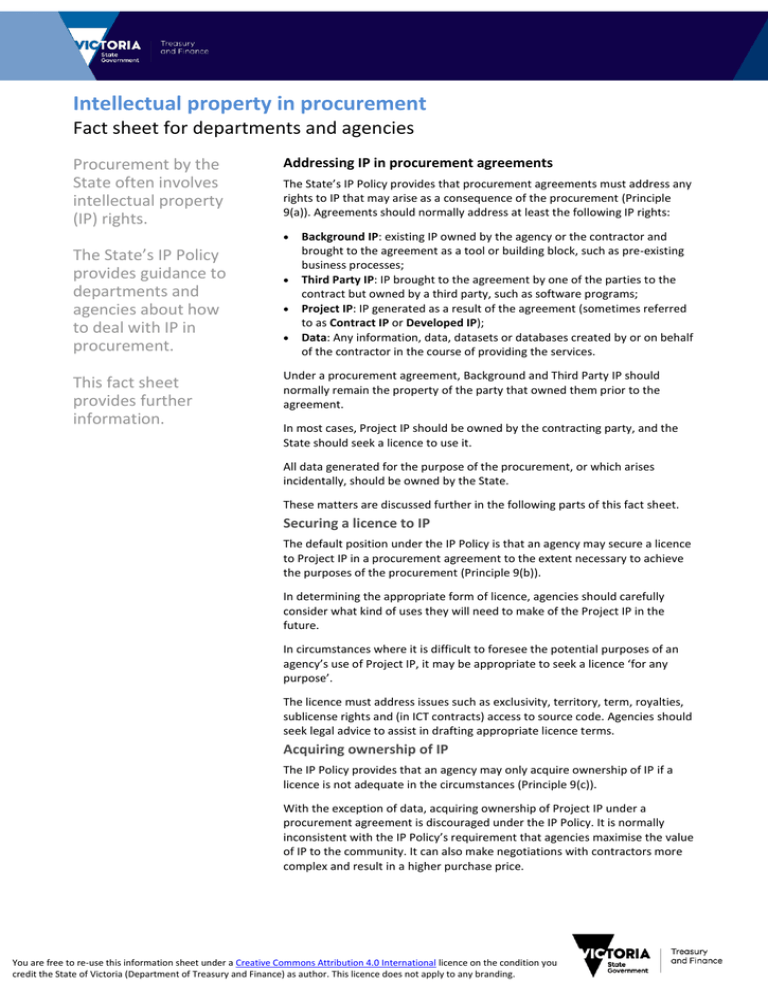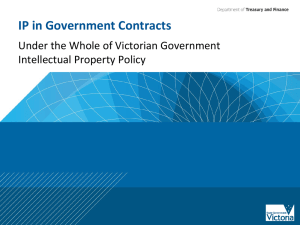Intellectual property in procurement
advertisement

Intellectual property in procurement Fact sheet for departments and agencies Procurement by the State often involves intellectual property (IP) rights. Addressing IP in procurement agreements The State’s IP Policy provides that procurement agreements must address any rights to IP that may arise as a consequence of the procurement (Principle 9(a)). Agreements should normally address at least the following IP rights: The State’s IP Policy provides guidance to departments and agencies about how to deal with IP in procurement. This fact sheet provides further information. Background IP: existing IP owned by the agency or the contractor and brought to the agreement as a tool or building block, such as pre-existing business processes; Third Party IP: IP brought to the agreement by one of the parties to the contract but owned by a third party, such as software programs; Project IP: IP generated as a result of the agreement (sometimes referred to as Contract IP or Developed IP); Data: Any information, data, datasets or databases created by or on behalf of the contractor in the course of providing the services. Under a procurement agreement, Background and Third Party IP should normally remain the property of the party that owned them prior to the agreement. In most cases, Project IP should be owned by the contracting party, and the State should seek a licence to use it. All data generated for the purpose of the procurement, or which arises incidentally, should be owned by the State. These matters are discussed further in the following parts of this fact sheet. Securing a licence to IP The default position under the IP Policy is that an agency may secure a licence to Project IP in a procurement agreement to the extent necessary to achieve the purposes of the procurement (Principle 9(b)). In determining the appropriate form of licence, agencies should carefully consider what kind of uses they will need to make of the Project IP in the future. In circumstances where it is difficult to foresee the potential purposes of an agency’s use of Project IP, it may be appropriate to seek a licence ‘for any purpose’. The licence must address issues such as exclusivity, territory, term, royalties, sublicense rights and (in ICT contracts) access to source code. Agencies should seek legal advice to assist in drafting appropriate licence terms. Acquiring ownership of IP The IP Policy provides that an agency may only acquire ownership of IP if a licence is not adequate in the circumstances (Principle 9(c)). With the exception of data, acquiring ownership of Project IP under a procurement agreement is discouraged under the IP Policy. It is normally inconsistent with the IP Policy’s requirement that agencies maximise the value of IP to the community. It can also make negotiations with contractors more complex and result in a higher purchase price. You are free to re-use this information sheet under a Creative Commons Attribution 4.0 International licence on the condition you credit the State of Victoria (Department of Treasury and Finance) as author. This licence does not apply to any branding. Intellectual property in procurement Fact sheet for departments and agencies The State may only acquire ownership of IP under a procurement agreement where the agency has a specific purpose for use of the IP that cannot be achieved under a licence. This may include: where development of the IP is the purpose of the contract; where an existing agreement requires the State to retain ownership of the IP; and where there are compelling reasons for the State to acquire or retain ownership of IP, such as privacy, public safety, security and law enforcement, public health and compliance with the law. Agencies should ensure their agreements deal with data and acquire IP ownership. The State enters into many contracts that result in the use, creation or assignment of data in some form. The data generated can be the purpose of the procurement (e.g. research), or arise incidentally. In both of these cases, data IP rights and issues must be addressed. The State must be able to use data freely and the default position, as identified in the DataVic Access Policy, is to publicly release data. If an agency does not wish to maintain ownership of a dataset, an agreement to license the data to use, reuse and share (preferably in accordance with a Creative Commons BY 4.0 licence) should be negotiated. Template IP clauses Agencies are encouraged to develop or amend existing template procurement contracts to include standard IP provisions that are consistent with the IP Policy. This can be achieved by adopting the Victorian Government Purchasing Board (VGPB) baseline contracts. The VGPB sets the policies that govern procurement of non-construction goods and services across all Victorian Government departments and some public bodies. VGPB’s baseline contracts are available: http://www.procurement.vic.gov.au/Buyers/Market-ApproachTemplates/Contracts The IP clauses in the VGPB’s baseline contracts are consistent with the IP Policy. In particular, the “Agreement for the Provision of Services (One Off Purchase)” has a detailed IP clause. DTF recommends that the VGPB’s contracts are adopted by agencies in appropriate circumstances, having regard to their needs. Further information For further information, DTF recommends that agencies refer to the IP Policy and the IP Guidelines: http://www.dtf.vic.gov.au/intellectual-property The DataVic Access Policy and Guidelines should also be consulted: http://www.dtf.vic.gov.au/Victorias-Economy/Victorian-Government-intellectualproperty-and-data-policies/DataVic-Access-Policy-and-Guidelines DTF’s IP team can be contacted directly with queries at IPpolicy@dtf.vic.gov.au or on (03) 9651 2455 You are free to re-use this information sheet under a Creative Commons Attribution 4.0 International licence on the condition you credit the State of Victoria (Department of Treasury and Finance) as author. This licence does not apply to any branding.
